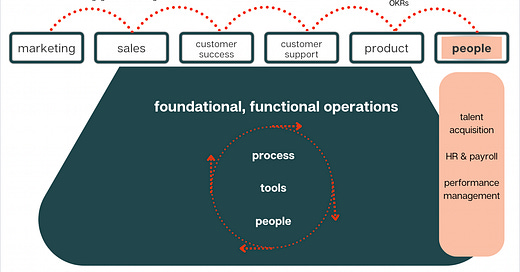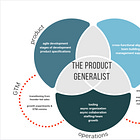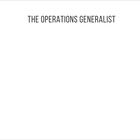What’s the difference between an HR specialist and a people generalist?
The fifth in a new hWD series on generalist vs. specialist hires. This week? People.
Once you expand beyond a team of one, suddenly your startup has “people” and a culture. And while you might not need a people team member to focus on the interactions between you and your cofounder (and if you do, hint: they call them executive coaches), as you become one of many, there will be technical (read: health insurance, PTO policies, 401K setup, etc) and non-technical (read: internal team wiki building, team meeting norms, async connection and collaboration rituals, etc) processes that need to be built to get your startup to go and grow. Understanding whether a people specialist or a people generalist is needed to support these initiatives will be crucial in building this path forward.
Reframing the people function in the early days
In the early days, most specialized people functions can be cobbled together with the help of a few core team members within small and growing teams. Leverage a Professional Employer Organization (PEO) and payroll software that’s tech-forward with around-the-clock support and a deep resource database to get you started. Leverage your startup lawyer to ask some tough employment and contractor law questions as they come up. The people function itself is a true byproduct of the size of your organization, so the team begets capacity; the bigger the team, the more specialized support you’ll need to manage the nuances of the whole and the technical complexity that will grow as you scale.
On top of the technical requirements of setting up your org to support your people, what’s non-negotiable is the need to build a well-functioning culture that extends beyond the individual habits of the founding team, your own “how We Do” that attracts talent aligned to your team and drives cohesion when things get tough. “The best way to not have a cohesive culture and not attract + retain the types of people you want is to have a generic hiring page, JD, interview process, and onboarding. The surprising thing is that embracing your opinions tend to lead to exceptional results” says Michael Houck.
Many a successful startup is built off of Peter Drucker’s infamous statement “Culture eats strategy for breakfast”. According to startup writer Evan Armstrong, “I would propose that the secret to building a successful technology company is culture-market fit. Culture-market fit (CMF) is that blissful intersection of an opportunity in the market with a culture that can execute on said opportunity. Allow me to clarify: CMF occurs when an organization matches with an opportunity, and the organization’s culture allows the right strategies and process to occur allowing them to capture said opportunity.”
This. stuff. matters. A lot. Hire early and choose wisely.
The People Specialist
A Human Resource (HR) or people specialist focuses on specific functions within the field of human resources, concentrating their expertise in particular areas rather than covering the broad spectrum of HR activities. These areas of specialization include recruitment and staffing, where specialists handle everything from crafting job descriptions to conducting interviews and managing the hiring process; training and development, which involves designing and implementing training programs to enhance employee skills and performance; and compensation and benefits, where specialists develop and manage compensation structures and benefits packages. Other critical areas include employee relations, focusing on resolving workplace issues and maintaining positive relationships between employees and management; compliance and safety, ensuring that the organization adheres to all employment and labor laws; and managing HR Information Systems (HRIS) to optimize HR technologies.
HR specialists require a blend of specific skills and qualifications to perform their roles effectively. They’ll likely maintain high technical proficiency, particularly with the growing use of data-driven HR practices and HRIS systems. HR specialists play a pivotal role in shaping an organization's workforce, ensuring compliance with legal standards, and fostering a competitive edge through strategic human resource management.
The People Generalist
A People Generalist is a versatile team member who manages a broad range of people functions, addressing the entire employee lifecycle from recruitment and hiring to training, performance management, and exit procedures. This role encompasses recruiting and staffing logistics, administering comprehensive orientation and training programs, overseeing payroll processing and benefits, and implementing company policies. People Generalists also manage employee relations, address grievances, mediate conflicts, and ensure a positive work environment.
People generalists often act as a crucial link between management and employees, aligning staff functions with the strategic goals of the organization. Their role is particularly essential in smaller organizations where resources for multiple specialized HR roles may be limited, requiring them to be highly adaptable and capable of managing various HR tasks effectively while ensuring the confidentiality of team member conversations.
Crucially, great people generalists will take an operator mindset, connecting team wiki building, SOPS, process management, and general internal product management to ensure that a healthy culture is built and maintained while the startup is scaling and in the “everything-is-figureoutable” stage.
who You Need
Finding the right fit for your people ops needs depends on your stage of growth and resource availability. Incorporating specialists early on is essential due to technical and legal requirements, but can take varying shape than simply having a team member devoted to it. Whether this entails adding a dedicated team member or leaning on outsourced tools or people depends on your current resources and team dynamics.
This need may further arise once your hiring process stabilizes, aligning with ongoing interviewing requirements as the team expands. People specialists offer valuable guidance concerning benefits and other regulatory aspects. However, an HR specialist might not be necessary until your team grows.
Starting with a generalist can make sense initially, especially when making early team investments. Supporting the operational people needs of your team with a generalist early on can pave the way for specialist roles as your organization evolves. Additionally, if fostering a strong organizational culture isn't a strength of the founding team, appointing someone to focus on this aspect becomes crucial.
Ultimately, your staffing decisions should align with your growth trajectory and the evolving needs of your organization. Whether you prioritize specialists or generalists initially, assembling a team that complements your MVV is key to propelling your business forward.
TLDR
You can assess the need for your early org in how each profile approaches their work, measures impact, and solves problems.
Approaching Work
The Specialist: There’s a relatively large technical skillset a People Ops specialist would typically use to approach their work. A founder can expect them to bring that perspective to the table and consider all relevant policies, processes/procedures, and employment requirements that could be at play; thinking through potential edge cases and exceptions; and applying the company's core values/core competencies to the solutions they recommend.
The Generalist: “A People Ops generalist would approach their work with a broad view of company culture, company people ops goals, and company business goals/strategy”, says Leslie, oAT generalist. “They can troubleshoot specialized people questions and procedures by taking a research-driven approach, leveraging external specialists where possible.”
Measuring Impact
The Specialist: Typically a People Ops specialist’s impact would involve delivering on one, some, or all of these goals:
Employee Hiring — meeting hiring targets by bringing in the right people to do their jobs
Employee Retention — building a great culture, engaging and developing employees, and retaining high-performing people
Managing risk for the company — setting policies, processes, and procedures that ensure the company is in compliance and is set up to handle potential issues that arise.
The Generalist: A People Ops generalist may be focused on driving impact in one or two key areas:
Employee Hiring — meeting hiring targets by bringing in the right people to do their jobs
Employee Retention — building a great culture, engaging and developing employees, and retaining high-performing people
Solving Problems
The Specialist: A People Ops specialist would solve problems with an eye toward delivering something that builds a positive culture for the company and aligns with its established norms and policies. They will probably lean on best practices, drawing not only from their own experience but also from technical standards established by a governing body, which they may have access to through an advanced degree.
The Generalist: A People Ops generalist would solve problems by thinking broadly about company culture, operations, and business goals/strategy. They’ll be focused on building and iterating on company practices around internal product management.
Before you go
As you consider the inflection points where people specialists and generalists make sense for your organization, consider that people as a function is so much more than the “once-we-have-50-people-and-close-our-A-we-should-hire-a-people-team” mindset of startup founders of yore. People and culture are crucial to the success of your organization. If, as a founder, you can't carve out intentional time to focus on these aspects, take a page from the playbook of the top companies we strive to emulate. They've recognized that nurturing a robust people function requires more than just quick fixes—it demands deep, thoughtful consideration. It's about fostering an environment "that urge(s) us to think, not just respond. Because that’s the place from which the enduring companies and careers will spring."
Writer: Britt









